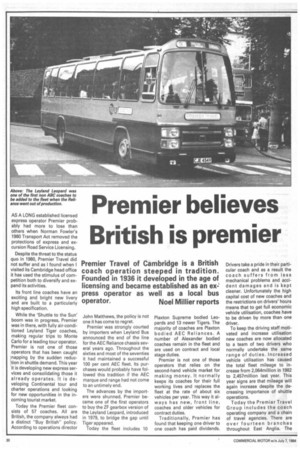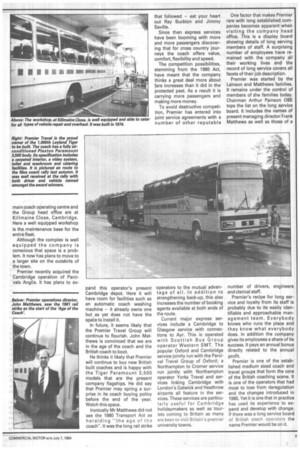Premier believes British is premier
Page 32

Page 33

If you've noticed an error in this article please click here to report it so we can fix it.
AS A LONG established licensed express operator Premier probably had more to lose than others when Norman Fowler's 1980 Transport Act removed the protections of express and excursion Road Service Licensing.
Despite the threat to the status quo in 1980, Premier Travel did not suffer and as I found when I visited its Cambridge head office it has used the stimulus of cornpetition both to diversify and expand its activities.
Its front line coaches have an exciting and bright new livery and are built to a particularly high specification.
While the 'Shuttle to the Sun' boom was in progress, Premier was in there, with fully air-conditioned Leyland Tiger coaches, making regular trips to Monte Carlo for a leading tour operator. Premier is not one of those operators that has been caught 'napping by the sudden reduction in shuttle demand. This year it is developing new express services and consolidating those it already operates. It is developing Continental tour and charter operations and looking for new opportunities in the incoming tourist market.
Today the Premier fleet consists of 57 coaches. All are British, the company always had a distinct "Buy British" policy. According to operations director John Matthews, the policy is not one it has come to regret.
Premier was strongly courted by importers when Leyland Bus announced the end of the line for the AEC Reliance chassis several years ago. Throughout the sixties and most of the seventies it had maintained a successful 100 per cent AEC fleet. Its purchases would probably have followed this tradition if the AEC marque and range had not come to an untimely end.
The advances by the importers were shunned. Premier became one of the first operators to buy the ZF gearbox version of the Leyland Leopard, introduced in 1979, to bridge the gap until Tiger appeared.
Today the fleet includes 10 Plaxton Supreme bodied Leopards and 13 newer Tigers. The majority of coaches are Plaxton bodied AEC Reliances. A number of Alexander bodied coaches remain in the fleet and are used on contract and local stage duties.
Premier is not one of those operators that relies on the second-hand vehicle market for making money. It normally keeps its coaches for their full working lives and replaces the fleet at the rate of about six vehicles per year. This way it always has new, front line, coaches and older vehicles for contract duties.
Traditionally, Premier has found that keeping one driver to one coach has paid dividends. Drivers take a pride in their particular coach and as a result the coach suffers from less mechanical problems and accident damages and is kept cleaner. Unfortunately the high capital cost of new coaches and the restrictions on drivers' hours means that to get full economic vehicle utilisation, coaches have to be driven by more than one driver.
To keep the driving staff motivated and increase utilisation new coaches are now allocated to a team of two drivers who normally undertake the same range of duties. Increased vehicle utilisation has caused the total fleet mileage to increase from 2,064million in '1982 to 2,457million last year. This year signs are that mileage will again increase despite the decreasing importance of shuttle operations.
Today the Premier Travel Group includes the coach operating company and a chain of travel agencies. There are over fourteen branches throughout East Anglia. The main coach operating centre and the Group head office are at Killmaine Close, Cambridge. Here a well equipped workshop is the maintenance base for the entire fleet.
Although the complex is well equipped the company is conscious that space is a problem. It now has plans to move to a larger site on the outskirts of the town.
Premier recently acquired the Cambridge operation of Parcivals Anglia. It has plans to ex pand this operator's present Cambridge depot. Here it will have room for facilities such as an automatic coach washing machine — it already owns one but as yet does not have the space to install it.
In future, it seems likely that the Premier Travel Group will continue to flourish. John Matthews is convinced that we are in the age of the coach and the British coach to boot.
He thinks it likely that Premier will continue to buy new British built coaches and is happy with the Tiger Paramount 3,500 models that are the present company flagships. He did say that Premier may spring a surprise in its coach buying policy before the end of the year. Watch this space.
Ironically Mr Matthews did not see the 1980 Transport Act as heralding "the age of the coach". It was the long rail strike that followed — eat your heart out Ray Buckton and Jimmy Saville.
Since then express services have been booming with more and more passengers discovering that for cross country journeys the coach offers value, comfort, flexibility and speed.
The competition possibilities, stemming from the 1980 Act, have meant that the company thinks a great deal more about fare increases than it did in the protected past. As a result it is carrying more passengers and making more money.
To avoid destructive competition, Premier has entered into joint service agreements with a number of other reputable operators to the mutual advantage of all. In addition to strengthening back-up, this also increases the number of booking agents available at both ends of the route.
Current major express services include a Cambridge to Glasgow service with connections to Ayr. This is operated with Scottish Bus Group operator Western SMT. The popular Oxford and Cambridge service jointly run with the Parcival Travel Group of Oxford; a Northampton to Cromer service run jointly with Northampton operator Yorks Travel and services linking Cambridge with London's Gatwick and Heathrow airports all feature in the services. These services are particularly useful for Cambridge holidaymakers as well as tourists coming to Britain as many are keen to visit Britain's premier university towns. One factor that makes Premier rare with long established companies becomes apparent when visiting the company head office. This is a display board showing details of long serving members of staff. A surprising number of employees have remained with the company all their working lives and the record of long service covers all facets of their job description.
Premier was started by the Lainson and Matthews families. It remains under the control of members of the families today. Chairman Arthur Painson OBE tops the list on the long service board. It includes the names of present managing director Frank Matthews as well as those of a number of drivers, engineers and clerical staff.
Premier's recipe for long service and loyalty from its staff is probably due to its easily identifiable and approachable management team. Everybody knows who runs the place and they know what everybody does. In addition the company gives its employees a share of its success. It pays an annual bonus directly related to the annual profit.
Premier is one of the established medium sized coach and travel groups that form the core of the British coaching scene. It is one of the operators that had most to lose from deregulation and the changes introduced in 1980. Yet it is one that in practice has used its experience to expand and develop with change. If there was a long service board of British coach operators the name Premier would be on it.




























































































